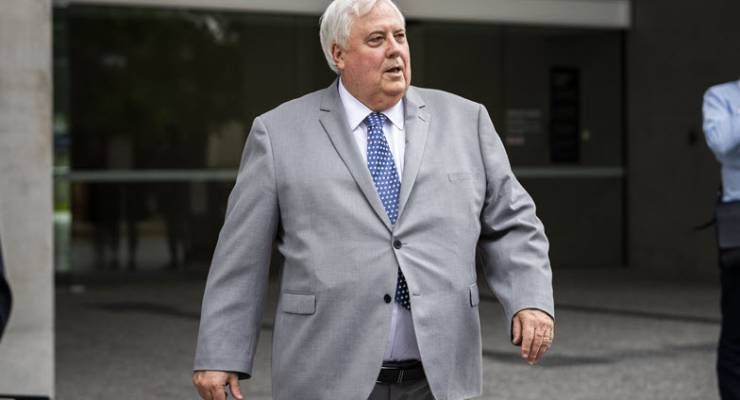
Ahead of his unsuccessful Senate campaign, Clive Palmer last month finally made a start on three years’ worth of outstanding payments to former employees of his collapsed refinery business Queensland Nickel. Palmer set up a trust fund administered by Brisbane lawyer Sam Iskander.
The fund has now been set up with Iskander’s Alexander Law to reconcile the outstanding $7 million (from a total $300 million owed to creditors, which was otherwise covered by the federal government). However, The Guardian last week reported that deed of release documents required workers to not make disparaging comments about Palmer in exchange for their money.
With workers owed the money either way, the question here is whether Palmer is allowed to trade employee entitlements for silence.
Are the gag clauses legal?
According to professor of employment law at the University of Adelaide Andrew Stewart, there’s nothing unprecedented or, on the face of it, unlawful about Palmer’s deed of release. The Fair Work Act dictates that employees cannot be coerced into giving away workplace rights, but confidentiality and non-disparagement clauses are common in settlement agreements. They just normally tend to apply either to companies themselves or, in the case of individuals, incidents of bullying or harassment.
“The attempt here to perhaps protect an individual from being disparaged, as opposed to a business, is slightly more unusual, but it’s not completely out of the ordinary,” Stewart said. “In the US, for example, you might get into issues about freedom of speech, but we don’t have freedom of speech in this country — not as a guaranteed right.”
Without something like the First Amendment in Australia, protections against censorship are slim — especially in an age when people can be fired for tweets about abortion or for briefly chatting to opposition leaders.
Stewart points to two major exceptions. Firstly, the High Court has found that our constitution, by setting up a political system, implies a freedom of expression on political matters. But rather than empowering individuals in private transactions, this implication acts as a restriction on parliaments to pass legislation that would prevent activities like political protests. So it does not apply in this case.
Secondly, despite the constant obfuscation of whistleblower cases such as the Witness K trial, common law principles dictate that confidentiality clauses cannot be used to hide crimes. Laws like the Treasury Laws Amendment (Enhancing Whistleblower Protections) Act 2019 prohibit punishing whistleblowing in the corporate, financial and credit sectors.
“But we’re not talking about whistleblowing, so even though yes there are restrictions on confidentiality clauses when it comes to whistleblowing, if the point of these gag clauses is just to prevent criticism of Clive Palmer, as opposed to preventing somebody from revealing wrongdoing, then that common law principle I mentioned, those whistleblower laws, they don’t have any application,” Stewart said.
What if they don’t want to take the deed?
What’s unique about Palmer’s case is that, while he is entitled to offer the deed of agreement and workers are similarly entitled to sign it, Queensland Nickel owes the money no matter what. The question becomes whether anyone would be willing to wait any longer in order to challenge the conditions of the deed.
“If you don’t put your hand up to take a settlement, you’ve still got your legal rights,” Stewart said. “The problem is how much is it going to cost you to pursue those rights, and how much money will be left?”
Acting on behalf of unionised former QN workers, Giri Sivaraman believes that exchanging the right to be critical for owed payments raises questions of coercion under the Fair Work Act. However, the case has not progressed since news broke of the agreement last Thursday as the union has not been in touch with workers who may have taken the agreement and moved on, or, as yet, decided to reject it and continue fighting.
Generally Sivaraman believes that, as is the case with many sexual harassment matters, the law around non-disparagement clauses is currently weighted heavily in favour of employers. Sivaraman believes the law should be reformed so that employees have greater legal recourse to avoid these kinds of clauses in agreements.
However, as it currently stands, it appears Palmer’s deed has not breached any existing Australian law.
“At the end of the day, if someone wants to sign up to that restriction, as an alternative to going to court, well that’s just a decision that they make, providing they are not being coerced into doing it, provided they’re not being stopped from revealing some kind of wrongdoing,” Stewart said. “On the face of it I’m not aware there’s anything from stopping those kinds of provisions from being agreed to.”








Crikey is committed to hosting lively discussions. Help us keep the conversation useful, interesting and welcoming. We aim to publish comments quickly in the interest of promoting robust conversation, but we’re a small team and we deploy filters to protect against legal risk. Occasionally your comment may be held up while we review, but we’re working as fast as we can to keep the conversation rolling.
The Crikey comment section is members-only content. Please subscribe to leave a comment.
The Crikey comment section is members-only content. Please login to leave a comment.